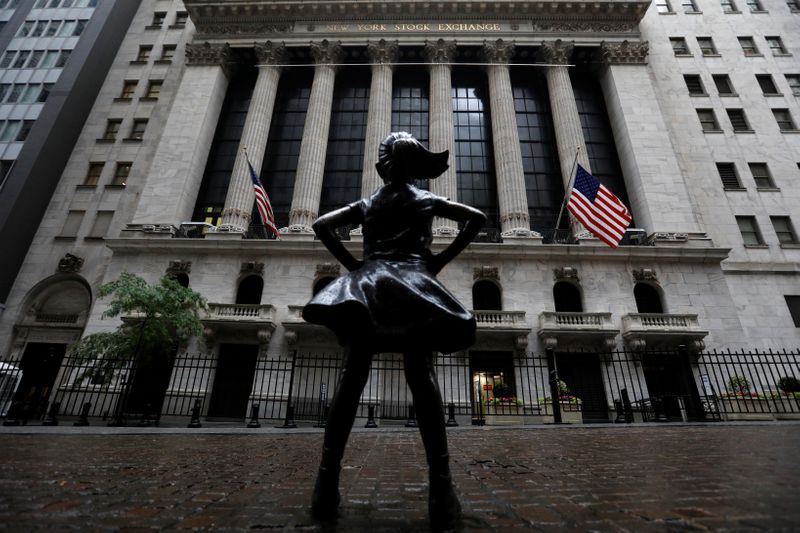
NEW YORK (Reuters) – Upcoming U.S. economic data and deadlines for renewing some fiscal stimulus measures in July could prove key tests for an equities rebound that has wavered in recent weeks.
The benchmark S&P 500 has risen about 34% from its late March lows. But those gains have slowed in June, as investors weigh expectations of further stimulus and improving data against a resurgence in coronavirus cases in the United States.
Investors will look to a raft of U.S. data next week – including reports on employment, consumer confidence and manufacturing – for clues on whether a nascent rebound in the U.S. economy remains intact.
Improvements in some economic indicators, such as home sales, manufacturing activity and an unexpected bounce in employment data last month, have bolstered investor confidence and helped extend the rally in stocks. But others, including scant declines in jobless claims, reflect a still-tentative recovery.
“There’s some evidence that the economy is expanding, but how robust it will be is an open question,” said David Joy, chief market strategist at Ameriprise Financial (NYSE:AMP).
Market participants are also looking for clues on whether lawmakers are likely to push through more fiscal stimulus measures in coming weeks.
The House of Representatives passed another $3 trillion aid bill in May, but the Republican-controlled Senate has not taken up the House package and lawmakers are not expected to move toward another coronavirus bill until sometime in July.
One component of Congress’ fiscal aid, a $600 per week supplement to unemployment insurance payments, is set to expire at the end of July.
Michael Wilson, chief U.S. equity strategist at Morgan Stanley (NYSE:MS), said that bill is critical to the bank’s thesis for a “V”-shaped U.S. economic recovery.
“Our outlook for the economy is probably going to have to change” without further stimulus, he said.
The looming deadline has added to a cluster of worries that have limited stocks’ gains this month. U.S. stocks tumbled this week, including a more than 2% drop on Friday, in response to a resurgence in the number of cases of COVID-19, the disease caused by the novel coronavirus.
Even with that recent pullback, stock valuations, as measured by forward price-to-earnings ratios, are near their highest level since the 2000 dot-com boom.
Other sources of worry include a potential flare-up in U.S.- China trade tensions and political uncertainty stemming from the Nov. 3 presidential election.
Some investors have already begun preparing for a potential market downturn by lightening their stock positions.
Oliver Pursche, president of Bronson Meadows Capital Management, said he recently sold shares of some tech-related companies, such as Amazon.com Inc (NASDAQ:AMZN)., in order to raise his cash allocation. Likewise, Richard Grasfeder, senior portfolio manager at Boston Private, has moved to a slight underweight position in U.S. equities.
In Grasfeder’s view, it could take longer than expected to see the impact of additional stimulus in economic data and corporate earnings.
“It’s going to take a while for those funds to flow through the economy,” he said.
Nonetheless, many on Wall Street remain confident that further aid will pass, given the presidential and congressional elections this November, and that will help prop up investor sentiment.
“My suspicion is it will happen before the July expiration,” said Ameriprise’s Joy. “You wouldn’t want to alienate your constituents unnecessarily.”
At the same time, some investors believe expectations that the Federal Reserve is ready to step in with further monetary support should the economy begin to falter will limit the downside in stocks and other risk assets.
Still, expectations for future market gyrations, as reflected by the Cboe Volatility Index, have remained elevated. Some volatility watchers believe markets could be choppier than usual this summer as investors await the passage of further stimulus and additional signs of economic recovery.
“It’s going to end up being a more volatile summer than traditionally is priced into the market,” said Amy Wu Silverman, equity derivatives strategist at RBC Capital Markets.



